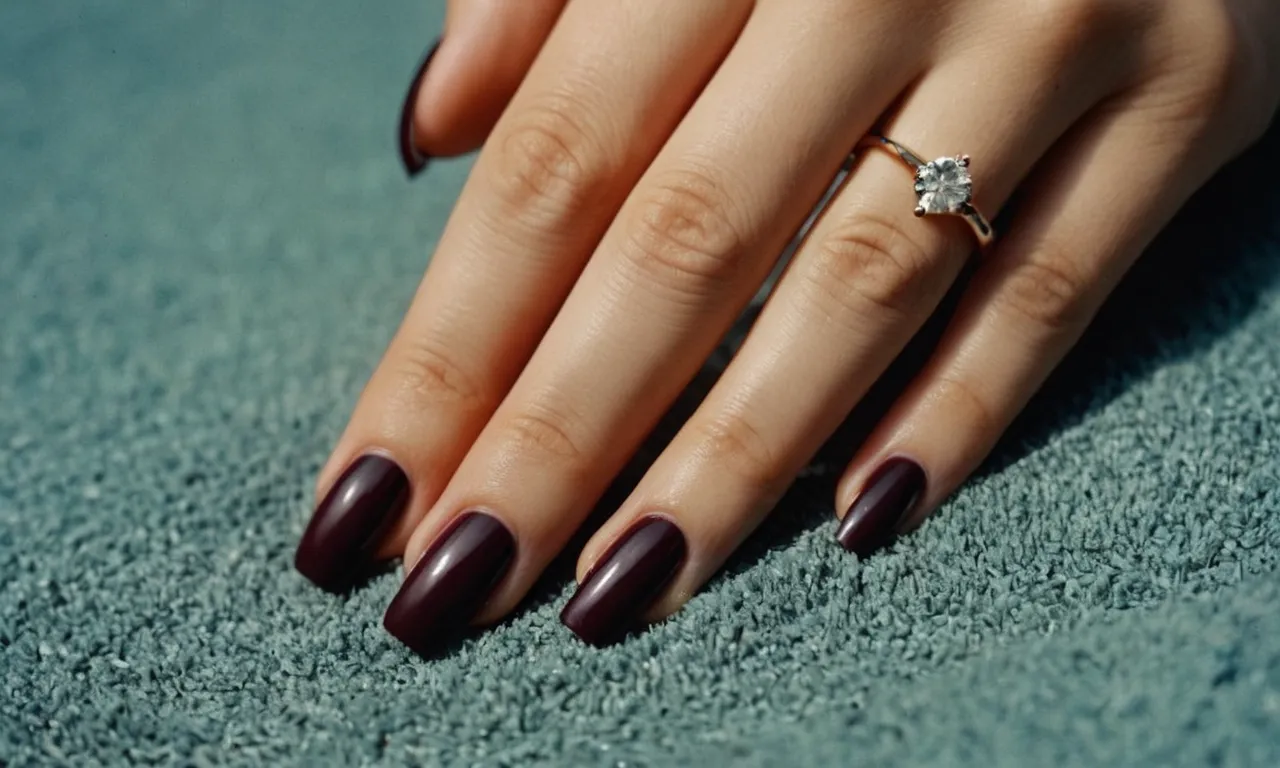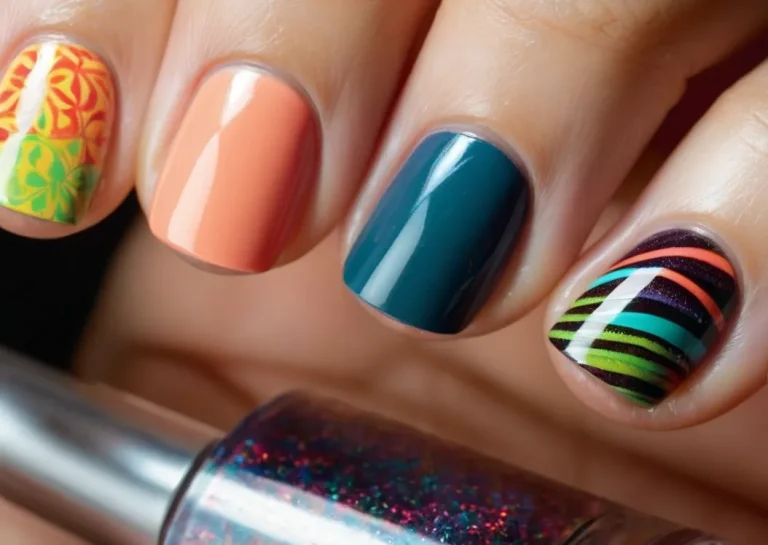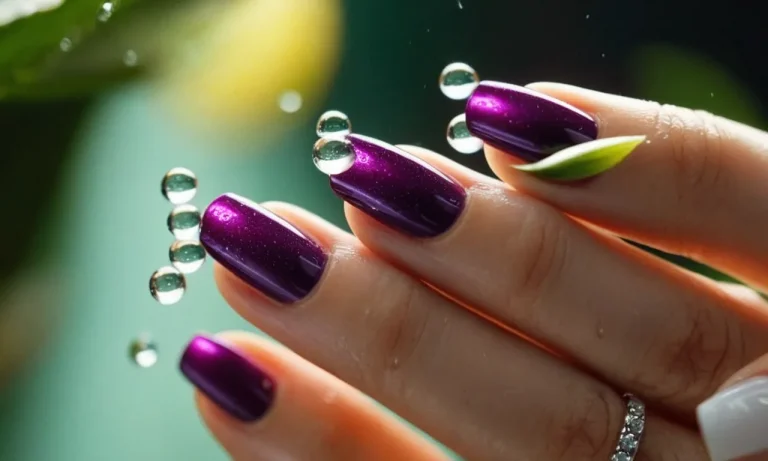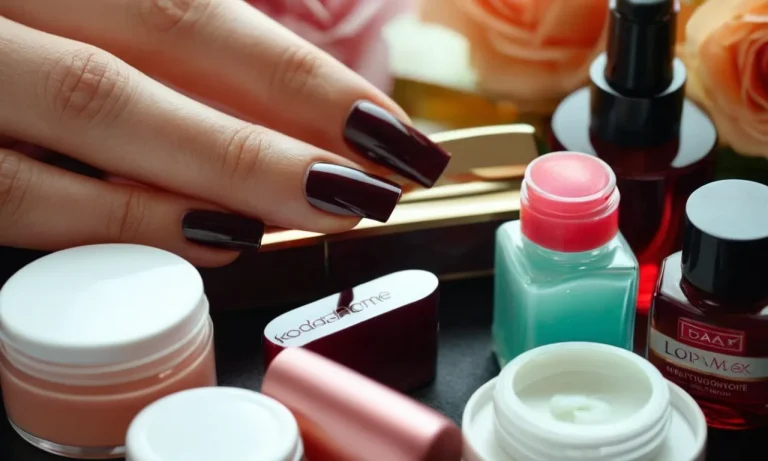Can You Get Your Nails Done If You Bite Them?
Nail biting is a common habit that leaves nails ragged and uneven. If you’re a nail biter wondering if you can still get a nice manicure, the answer is yes! With some preparation beforehand and choosing the right nail services, bitten nails can be shaped, polished and look great.
If you’re short on time, here’s a quick answer: With the right techniques and nail services, it is absolutely possible to get your bitten nails beautified at a salon.
Assessing Your Nails’ Condition
How short and ragged are they?
When deciding if you can get your nails done when you bite them, first take a close look at just how short and ragged they are. Extremely short nails with rough, uneven edges will be more difficult for a technician to work with. Here are some questions to ask yourself:
- Are most of your nails gnawed down to the nail bed? This leaves very little room for a technician to apply tips or overlays.
- Do you have any painful hangnails or snags from biting? These could make manicures uncomfortable.
- How often do you bite or pick at your nails? Frequent biting right after a manicure will quickly ruin the results.
If your nails are short but relatively smooth and not irritated, a technician can likely shape and buff them nicely. But very ragged nails or ongoing biting may mean you need to grow them out more before professional work.
Any nail damage or infections?
Along with assessing length, check your nail condition to identify any issues like infections or damage from biting. Here’s what to look for:
- Discoloration or thickening of the nails can signal a fungal or bacterial infection, making manicures inadvisable until treated.
- Red, swollen, or painful skin around the nails may indicate an infection.
- Cracked, peeling nails are common from frequent biting and will need strengthened before polish can adhere well.
Minor white spots or surface damage is normal and can be buffed out or covered with overlays. But significant infections require medical treatment, as manicures could worsen the condition. It’s ideal to see improvement of any infections before booking nail services.
To sum up, take an honest look at your nail length and condition first. Very short, inflamed, or infected nails will likely need more time to recover. But if they have some length and are in fairly good shape, a talented technician should be able to work their magic!
Going for consultations can help you gauge whether salons are willing and able to take on the challenge.
Preparing Your Nails Beforehand
Let them grow out a bit
If you’re used to biting your nails down to the quick, it’s best to let them grow out a little before getting them done professionally. This gives the nail technician something to work with. Growing your nails out for 2-3 weeks beforehand is ideal. Resist the urge to bite them during this time!
The longer you can allow your nails to grow out, the better the end result will be.
Moisturize and use treatments
Once your nails have had some time to grow, it’s important to moisturize and strengthen them. Since you’ve likely been biting them for awhile, the nails and skin around them is likely quite dry and damaged. Apply a thick moisturizing lotion or cuticle oil daily.
You can also use strengthening treatments, like nail hardeners, to repair weak or peeling nails.
Some great products to try:
- Cuticle oil – Apply this around the nail and cuticles daily to hydrate.
- Biotin – This vitamin supports healthy nail growth when taken as a supplement.
- Nail hardener – Contains ingredients like calcium, keratin, or formaldehyde to harden nails.
Using these kinds of treatments will prep your nails for polish and help them look their best. The nail technician will also appreciate that you’ve made an effort to care for your nails in advance!
Avoid further biting
Of course, it’s important not to bite or pick at your nails once you’ve started growing them out. I know – easier said than done! But try your best to kick the habit, at least temporarily. An accountability partner can help keep you focused.
Distractions like fidget toys or rubber bands around your wrists give your hands something else to play with.
If you slip up and bite them a little, don’t fret. Just let them grow out again and do your moisturizing treatments. With some diligence and perseverance, you’ll get those nails ready for polish in no time! The fabulous manicure will be worth it.
Choosing the Right Nail Services
Nail trimming and shaping
Getting your nails trimmed and shaped is a great option if you tend to bite or pick at your nails. The nail technician can trim your nails short and round the edges so there are no jagged bits to bite or pick at. This helps your nails look neater and more even.
The shaping can also remove any tempting hangnails you might be inclined to bite off. Regular trims every 2-4 weeks will maintain your nails’ length and shape so you’re less likely to put them in your mouth.
Artificial nail overlays
If your natural nails are very short or weak from frequent biting, artificial nail overlays like acrylics or gel polish can strengthen them and make them less tempting to bite. The artificial material covers your natural nails completely, helping you break the habit while giving you pretty nails to show off.
Just be sure to go to a reputable salon so they are applied properly – improperly applied acrylics or gels can sometimes damage natural nails over time. Regular infills every 2-3 weeks will help the overlays stay strong and intact.
Regular or gel polish
Getting a fresh coat of regular lacquer or gel polish can also help deter biting. The smooth, glossy finish and pretty colors give you a reason not to ruin the manicure. Some people find certain polishes with a bitter taste serve as an additional reminder not to bite.
Frequent applications every 1-2 weeks ensure your polish stays pristine. Going for longer lasting gel polish means it will chip and peel less between appointments. Just be sure to moisturize your nails and cuticles well so the polish adheres properly.
No matter which service you choose, visiting the salon regularly helps you maintain beautiful, bite-free nails. The nail technicians can also monitor your progress and offer tips. Getting your nails done gives you confidence to finally break the biting habit.
With diligent care and patience, you can sport gorgeous nails to be proud of!
Aftercare and Stopping Further Biting
Caring for your nails post-manicure
Getting regular manicures can help motivate you to stop biting your nails. But preserving your fabulous new nails requires diligent aftercare. Moisturize cuticles daily with oil to keep them soft and prevent peeling or hangnails that tempt nibbling.
Buff away small chips immediately and avoid chores that abuse your hands during the first week after a mani. If you just can’t resist the urge to chew, try massaging your fingers or squeezing a stress ball instead. And be patient with lapses as you work to kick the habit for good.
Using deterrents for your nail biting habit
If motivation alone isn’t enough to curb your nail biting, try one of these deterrent strategies:
- Apply a bitter medicated ointment like Mavala Stop to make nails taste awful
- Wear bandages or finger cots on problem digits to physically block biting
- Get regular polish changes to avoid ragged edges that trigger chewing
- Set phone alerts to remind yourself to stop nibbling throughout the day
Replacing an unconscious habit takes conscious effort. But taking good care of your nails post-manicure helps reinforce your resolve to quit. With diligence and these deterrents, you can kick the biting habit for healthier, more beautiful nails.
Answering Common Concerns
Will salons turn me away?
For the most part, nail salons will not turn away those with severely bitten nails. However, very short, damaged nails can present challenges. Nail technicians may recommend getting extensions or acrylics instead of regular manicures.
Still, a good nail technician wants to help you on your journey to healthy nails. Many offer treatment add-ons like intensive cuticle repair creams or nail strengthening serums.
A survey by NAILS Magazine in 2021 found that 76% of nail techs said they would service clients with extremely short or bitten nails. However, they may advise getting enhancements to protect your nails while they grow out.
Salons focused on natural nail care may provide more options for those with shorter nails. Doing your research to find an empathetic nail tech can give you added comfort. Reach out beforehand to explain your situation.
How much will it cost?
Getting your bitten nails professionally done costs similar to a standard manicure. According to nationwide statistics, a basic manicure averages $20. However, those with shorter, damaged nails may need extensions, acrylics or gel polish to protect nail beds, costing $45-$85 on average.
Here’s a comparison of common nail services:
| Service | Average Cost |
| Basic manicure | $20 |
| Gel manicure | $35 |
| Acrylic full set | $45 |
| Nail extensions | $65 |
| Nail treatment addons | $5-$20 |
The right nail technician will work within your budget. Be upfront about costs early on. Many salons run weekly specials on manicures or extensions. You can also find local nail salon deals through Groupon to reduce expenses while rebuilding your nails.
Investing in professional manicures helps encourage new nail growth. The American Academy of Dermatology confirms that consistent nail treatments stimulate healthy regrowth. Working with a sympathetic nail tech may provide added accountability as you stop the biting habit.
Over time, the investment pays dividends through confident, beautiful nails.
Conclusion
While getting a flawless manicure is more challenging with bitten nails, the good news is that with some planning and choosing services suited for short, uneven nails, you can still get your nails beautifully shaped and polished at a salon.
It may take more time and money than someone with longer nails, but the end results will boost your confidence and hopefully motivate you to kick the biting habit for good.







